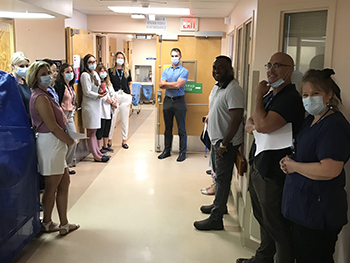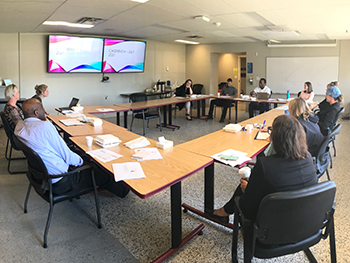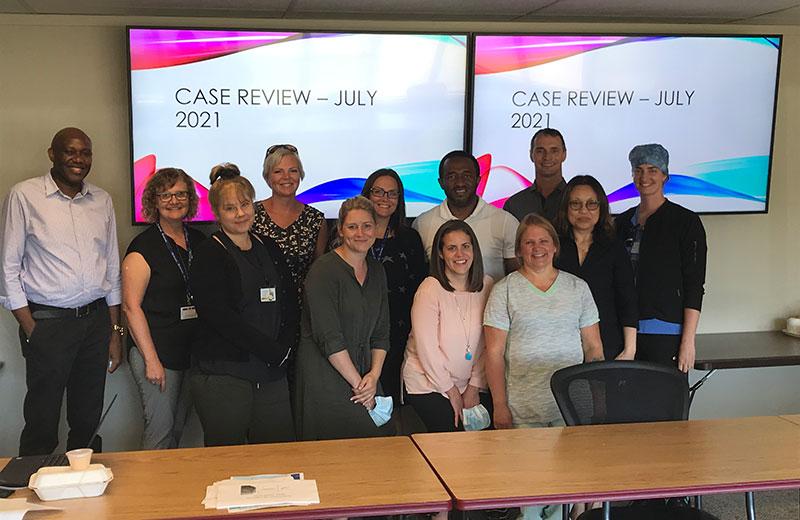Improving maternity services in Quesnel is important to doctors, nurses, and other staff who work in the community. In 2020, health care providers who work with maternity patients started a project to revamp maternity services to make them sustainable, to have all the doctors and nurses and everyone else who provides those services come together as a team, and to figure out where any problems were.
Strong leadership essential in team success

The project’s first step was to find a doctor to lead the work: Dr. Boakye, the obstetrician/gynecologist in Quesnel. He’s the reason that a strong team came together to focus on improving maternity services.
He’s focused on teamwork, responds to everyone, brings the team together, and coaches their case reviews,” said a member of the Quesnel maternity team.
In a recent summary document, the Quesnel maternity team also reported that, “having a strong maternity leader (Dr Boakye) in the community whom we all respect is very important to help guide the improvement work.”
With the support of Margie Wiebe, practice support coach, and Vanessa Salmons, executive lead for the perinatal program, the team was successful in receiving funding from the Rural Coordination Centre of BC (RCCBC), and the General Practice Services Committee (GPSC) for all Quesnel doctors and nurses to do case reviews and attend the team-based care learning series. In addition, these organizations also provided funding for meals during the training and case reviews.
“Funding for food was critical. The delicious meals were a drawing card for attendance at case reviews during noon hours. We also felt supported by local restaurants during a difficult time during the COVID-19 pandemic, with great options for ordering out and delivery,” said a member of the Quesnel maternity team.
Learning and problem solving together
The group also wanted to figure out how to work together as a team, which is where the team-based care learning series from the Practice Support Program (PSP) comes in. The team took four sessions: foundations/team mapping, patient-centred care, interprofessional communication, and interprofessional conflict management.
The PSP coach, Margie Wiebe, organized and facilitated these series together with physician mentors, and provided coaching to implement changes. The team mapping session was especially beneficial in leading to proposed changes to improve maternity services, and many of the learnings positively influenced changes in how case reviews were conducted.
The value of having all the care providers together for case reviews was an important learning from the PSP team mapping session and the interprofessional communication learning session. Now the team regularly includes primary care nurses in case reviews, not just doctors and labour delivery nurses, and the case reviews cover the entire journey of pregnancy, from the start of pregnancy, through prenatal visits, to delivery, and up to six weeks after delivery.
Patients appreciate quality improvement process

For the case reviews, Amber Wenzel, the team leader, works hard to prepare cases. As well, the team gets permission from patients to review their cases to find issues or gaps in care. Together, the team problem-solves how to improve, so any issues don’t happen to the next person.
One nurse on the team said, “Patients tell me they like to hear their case gets discussed at case reviews so the problems they had can be resolved.”
The team became more patient-centred after the learning session on patient-centred care. Now, the team now asks themselves if their conversations with patients and during case reviews align with the following important questions:
Did we:
- Listen and give the patient time to think before responding?
- Ask the patient what worries or concerns them?
- Consider or ask about cultural traditions?
- Ask about personal preferences and values?
- Ask about their lifestyle, work, and family situation?
- Ask them about loved ones they want involved in their care?
- Ask them about their goals, and then document patient goals in the chart?
The team decided they wanted to survey patients to see if they were improving in patient-centred care, so the PSP coach introduced them to the Practice Support Program’s secure Patient Experience Tool. The team has adopted the tool and now has a means to learn from patients how to improve.
The team is also continuing to do case reviews. Any problem found in a review with the patient’s care is solved right away.
Expanding services is the goal
Going forward, the maternity team is working to expand services, not just sustain them. For example, as a result of a team mapping session, many gaps in consistencies in care were identified. Therefore, the team started to investigate successes seen in maternity clinics across the province. Maternity clinics have been shown to help with consistency in care, improved access, and improvements to both patients’ and health care providers’ satisfaction.
The Quesnel maternity team has a vision for creating a maternity clinic in Quesnel. Maternity patients could be referred there by their family doctor to be seen by any of the four maternity doctors, and possibly a nurse practitioner, throughout their pregnancies. The clinic would also be a centralized place for patients to see community primary care nurses, who organize all support services within the community based on the first prenatal visit assessment.
Prenatal classes, breastfeeding support and all other supports moms and babies need would be provided from this centralized place. Everyone providing maternity services would physically work together in the same space, making it easier for them to collaborate and work as a team. As well, this model of care would also allow for better work-life balance for doctors as they rotate through the on-call schedule. A proposal for the maternity clinic is under development, and the team hopes to move forward with it soon.
Flash forward from one year ago to a recent team evaluation meeting: One of the team members said, “The maternity team in our rural town of Quesnel now all know each other, we are cohesive, collegial, and collaborative, and have fun together.” The team whole-heartedly agrees that they are working toward becoming more patient-centred.
Recognition of team success
The success this team has achieved has been recognized by a Salus Global Recognition Award for 2021. Criteria include core team effectiveness, leadership support, effective high-quality communication, and engagement and involvement of all professions and applications to practice. This award celebrates the milestone achievements and recognizes the high performance of the team.
Despite the pandemic, the team has continued to work towards improving the patient experience and creating positive outcomes in perinatal care. In the past year, the team met and reviewed 84 perinatal cases for quality improvement, in addition to reviewing best practices, NH policies, and guidelines from the Society of Obstetricians and Gynaecologists of Canada (SOGC). Throughout the pandemic, the team has continued to connect, collaborate, learn, and build on their relationships.
The application of knowledge, communication, and teamwork to make patient safety a priority has been paramount. Northern Health is very appreciative of this team and their level of commitment to best practices in the care of moms, babies, and families in Quesnel and the surrounding area. We look forward to more amazing work ahead!















Continue to make the impact that matters . Great Job!